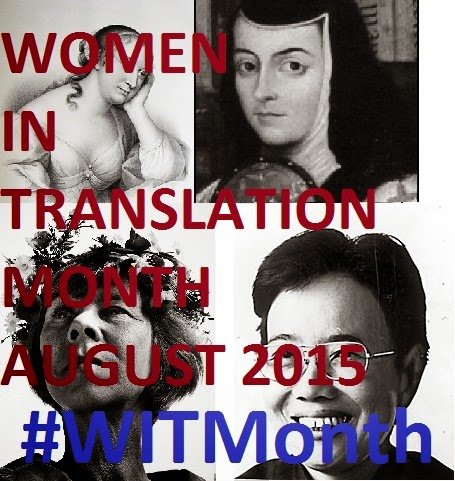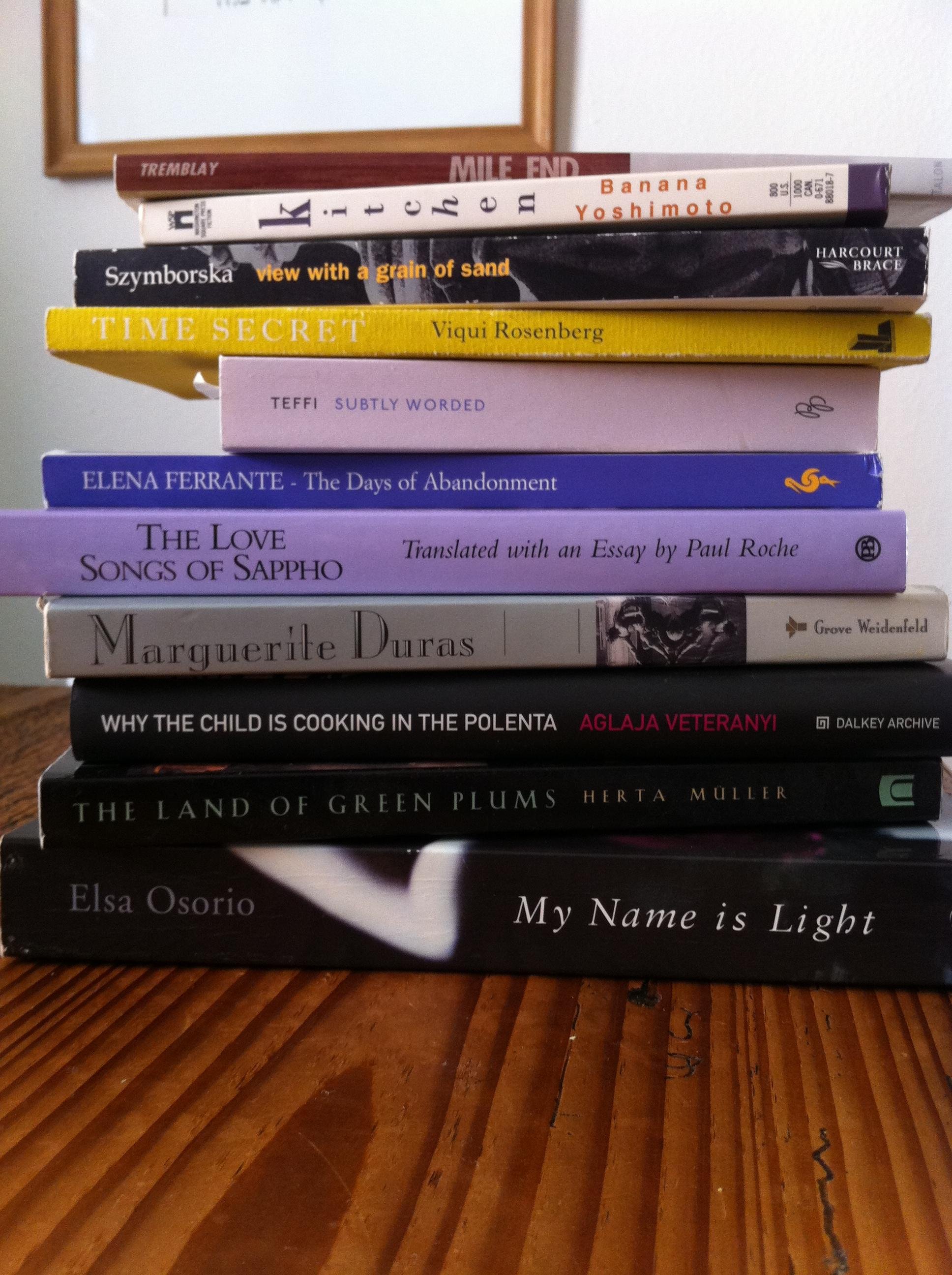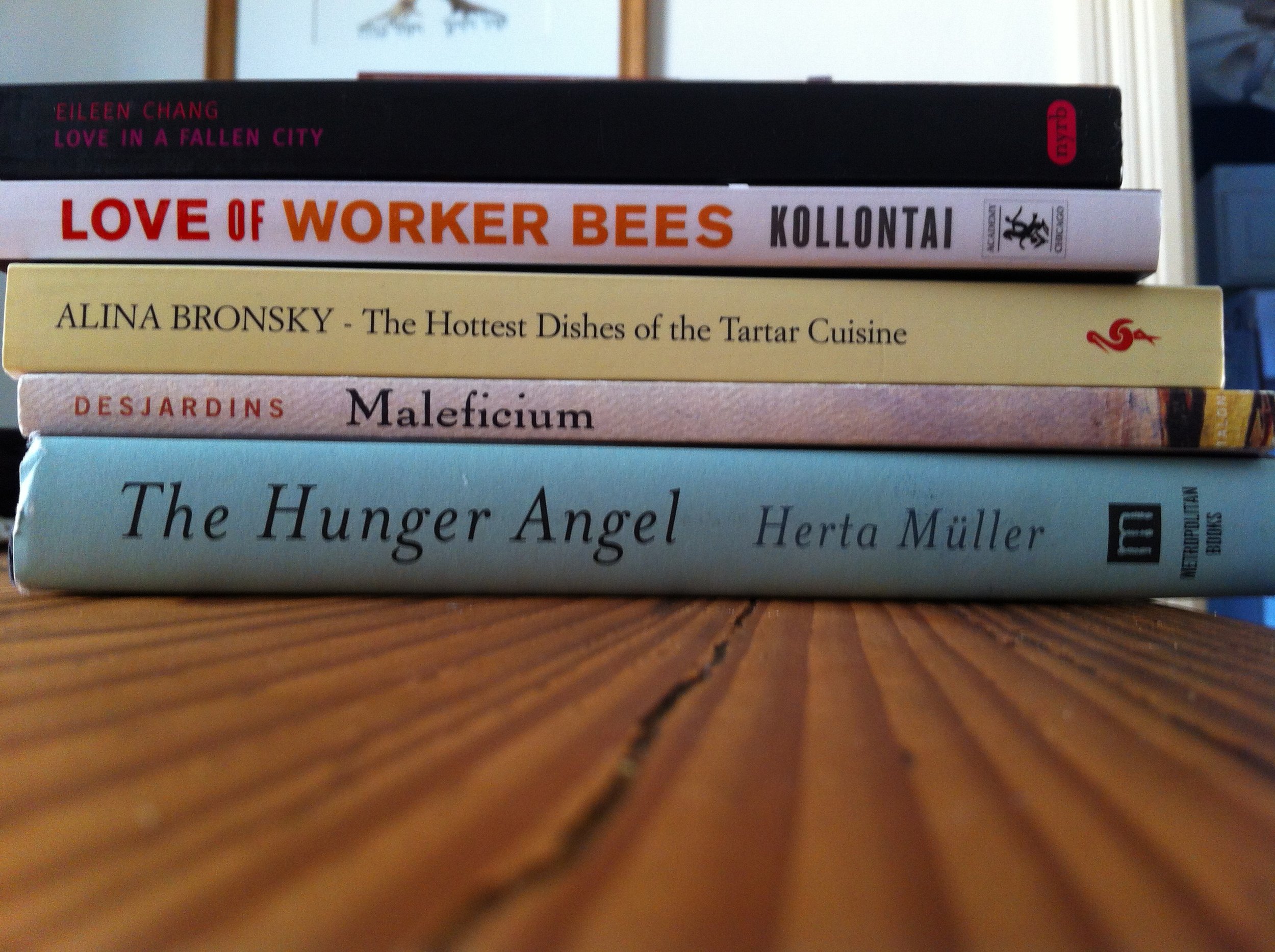 August is Women in Translation Month (WITMonth), designed to encourage readers, reviewers, publishers, and translators to explore more books in translation by women. If you've been following the VIDA count, then the grim statistics around women in translation (gathered diligently by Meytal Radzinski) is, unfortunately, not a surprise: women writers comprise only about 30% of books translated into English. As I'm passionate about cultivating a diverse literary ecosystem, this is a project near and dear to my heart. And though I'm happy WITMonth is an annual event, I'm getting started right now. Because there are SO MANY good books and I'm sure there are SO MANY MORE out there waiting to be picked up by a publisher and gobbled by readers.I immediately pulled all the books from my shelves that fit the bill. I made a read pile and a to-be-read pile. Of the read pile, I'd like to make some recommendations, for those of you who'd like to join me in WITMonth. Read these books! And I'll be diving into the to-be-read pile and writing about the gems in that pile in August. Read those books too! Let's talk about 'em!Recommended Books
August is Women in Translation Month (WITMonth), designed to encourage readers, reviewers, publishers, and translators to explore more books in translation by women. If you've been following the VIDA count, then the grim statistics around women in translation (gathered diligently by Meytal Radzinski) is, unfortunately, not a surprise: women writers comprise only about 30% of books translated into English. As I'm passionate about cultivating a diverse literary ecosystem, this is a project near and dear to my heart. And though I'm happy WITMonth is an annual event, I'm getting started right now. Because there are SO MANY good books and I'm sure there are SO MANY MORE out there waiting to be picked up by a publisher and gobbled by readers.I immediately pulled all the books from my shelves that fit the bill. I made a read pile and a to-be-read pile. Of the read pile, I'd like to make some recommendations, for those of you who'd like to join me in WITMonth. Read these books! And I'll be diving into the to-be-read pile and writing about the gems in that pile in August. Read those books too! Let's talk about 'em!Recommended Books Death in Spring by Mercè Rodoreda, translated from Catalan by Martha Tennent (Open Letter, 2009). A gorgeously written and harrowing novel about cruelty among humans and violence in nature.Days of Abandonment by Elena Ferrante, translated from Italian by Ann Goldstein (Europa Editions, 2005). A dark, slender novel about a woman abandoned by her husband spiraling into terrifying psychological territory, with a helpful dash of absurd humor and redemption. After devouring this book, anything else was VERY difficult to get into. So good. This brief review in The New Yorker is spot on. I have not cracked open her more recent Neapolitan series, but it is definitely on the docket.The End of the Story by Liliana Heker, translated from Spanish by Andrea G. Labinger (Biblioasis, 2012). Another dark novel. I'm sensing a trend? This metafictional work explores Argentina's Dirty War. I reviewed it for Ploughshares.Death as a Side Effect by Ana Maria Shua, translated from Spanish by Andrea G. Labinger (University of Nebraska Press, 2010). As I note briefly in my review of Heker's novel, Shua's is "dark and wry and screwed up in the best possible dystopian way." Is it weird to quote myself? Oh well.Dreams and Stones by Magdalena Tulli, translated from Polish by Bill Johnston (Archipelago Books, 2004). I adore Archipelago for focusing on translation and producing truly beautiful books. Dreams and Stones is probably the least dark book on my list, a kind of treatise on cities and imagination.Mile End by Lise Tremblay, translated from French by Gail Scott (Talon Books, 2002). I read this novel a few times, starting in a class in college on literary Montreal. It's set in the neighborhood I lived in while at McGill, which may be part of my attachment to it. And, yes, yes, this is another dark story, about an obese pianist at a ballet school teetering toward psychosis.The Land of Green Plums by Herta Muller, translated from German by Michael Hoffman (Metropolitan Books, 1996). Muller, winner of the 2009 Nobel Prize in literature, paints a grim picture of life in Romania under Ceausescu. The language is highly poetic, and I've been working on an essay about it (among other things) for quite some time. In fact, the assignment I've given myself for the next few weeks is to cut that essay up paragraph by paragraph to figure out how to keep going with it.Why the Child is Cooking in the Polenta by Aglaja Veteranyi, translated from German by Vincent Kling (Dalkey Archive Press, 2012). Told from the point of view of an unnamed young woman, this is the story of Romanian refugees who travel through Europe as circus performers. Yes, yes, dark. But also with absurd humor. (Some criticize Muller for being humorless. I say, bah. Read her still. Not everything is funny ha ha.)Phew. That's a lot of recommendations. There are more in my pile. I may write more about them. More likely I will tweet my favorite bits from them in August. But not just August. Probably all year. WITForever!My To-Be-Read Pile. Stay tuned for reviews & more !
Death in Spring by Mercè Rodoreda, translated from Catalan by Martha Tennent (Open Letter, 2009). A gorgeously written and harrowing novel about cruelty among humans and violence in nature.Days of Abandonment by Elena Ferrante, translated from Italian by Ann Goldstein (Europa Editions, 2005). A dark, slender novel about a woman abandoned by her husband spiraling into terrifying psychological territory, with a helpful dash of absurd humor and redemption. After devouring this book, anything else was VERY difficult to get into. So good. This brief review in The New Yorker is spot on. I have not cracked open her more recent Neapolitan series, but it is definitely on the docket.The End of the Story by Liliana Heker, translated from Spanish by Andrea G. Labinger (Biblioasis, 2012). Another dark novel. I'm sensing a trend? This metafictional work explores Argentina's Dirty War. I reviewed it for Ploughshares.Death as a Side Effect by Ana Maria Shua, translated from Spanish by Andrea G. Labinger (University of Nebraska Press, 2010). As I note briefly in my review of Heker's novel, Shua's is "dark and wry and screwed up in the best possible dystopian way." Is it weird to quote myself? Oh well.Dreams and Stones by Magdalena Tulli, translated from Polish by Bill Johnston (Archipelago Books, 2004). I adore Archipelago for focusing on translation and producing truly beautiful books. Dreams and Stones is probably the least dark book on my list, a kind of treatise on cities and imagination.Mile End by Lise Tremblay, translated from French by Gail Scott (Talon Books, 2002). I read this novel a few times, starting in a class in college on literary Montreal. It's set in the neighborhood I lived in while at McGill, which may be part of my attachment to it. And, yes, yes, this is another dark story, about an obese pianist at a ballet school teetering toward psychosis.The Land of Green Plums by Herta Muller, translated from German by Michael Hoffman (Metropolitan Books, 1996). Muller, winner of the 2009 Nobel Prize in literature, paints a grim picture of life in Romania under Ceausescu. The language is highly poetic, and I've been working on an essay about it (among other things) for quite some time. In fact, the assignment I've given myself for the next few weeks is to cut that essay up paragraph by paragraph to figure out how to keep going with it.Why the Child is Cooking in the Polenta by Aglaja Veteranyi, translated from German by Vincent Kling (Dalkey Archive Press, 2012). Told from the point of view of an unnamed young woman, this is the story of Romanian refugees who travel through Europe as circus performers. Yes, yes, dark. But also with absurd humor. (Some criticize Muller for being humorless. I say, bah. Read her still. Not everything is funny ha ha.)Phew. That's a lot of recommendations. There are more in my pile. I may write more about them. More likely I will tweet my favorite bits from them in August. But not just August. Probably all year. WITForever!My To-Be-Read Pile. Stay tuned for reviews & more !

 August is
August is 
